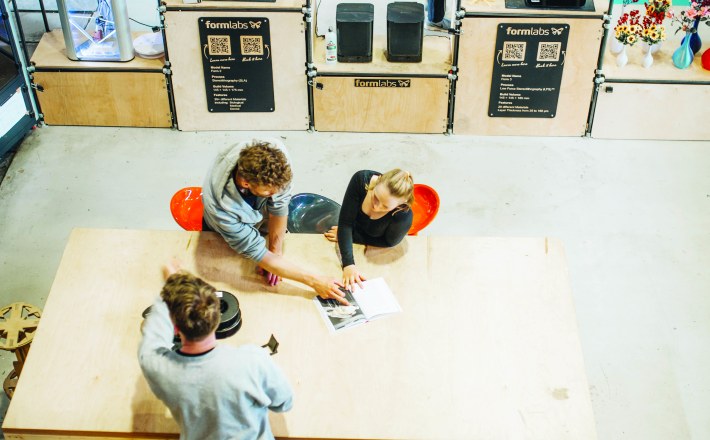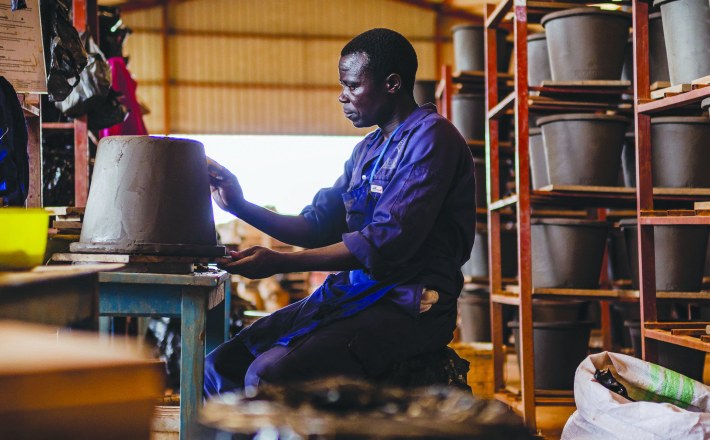Too good to go
Food wastage is as much a part of our everyday lives as bread and butter – alarmingly so. Around a third of perfectly good food is regularly thrown away in Europe alone. The Too Good To Go app is designed to put an end to this by making it easy for suppliers and consumers to save food.
COMPANION talks to Laure Berment, Germany’s Country Manager at Too Good To Go, about wonky pickles, women as managers and, of course, saving food.
No-one is entirely blameless it seems: food is wasted at every conceivable stage of the chain. And although we are quick to cast suspicious glances at the hospitality industry, private households, producers and supermarkets are sadly too willing to toss away leftover food. In total, Europe discards approximately 88 million tonnes of edible food each year. A shameful statistic.
Stian Olesen, Thomas Momsen and Klaus Pedersen from Denmark certainly thought so when they launched Too Good To Go in 2015. Their principle is as simple as it is ingenious: restaurants, snack bars, bakeries and supermarkets can register quickly and easily on the app and post when they have leftover meals or products. Users scroll through ads in their immediate vicinities, pay for the products in the app and then pick up their shopping within a defined period. Customers receive delicious food at a reduced rate, and the providers can up their earnings compared to just getting rid of the food while earning sustainability kudos as well. “We work together to save food – and everybody benefits”, says Laure Berment. She is the Country Manager for Too Good To Go in Germany.

Her best rescue so far was in a supermarket in Cologne, where she managed to scavenge a huge batch of vegetables, which she then transported back to Berlin by train. “I’m a big fan of supermarket options, because it is easy to save bread or vegetables – a fact that many of us do not know”, explains Berment. Big selection, huge impact: just five years since its inception, Too Good To Go has expanded its reach to around 46,000 partner shops across Europe, and the app is currently supported in 14 countries. In the process, the start-up and its community of almost 23 million users have saved roughly 38,000 meals from the rubbish bin. It’s also about the climate: the Europe-wide food rescue campaigns have eliminated a whopping 95,000 tonnes of carbon emissions so far. After all, rescuing food is not only good for your own diet, wallet and clear conscience, but also for the world as a whole.
Is this a deal that sounds too good to be true? You can’t help but ask whether there might be a few black sheep hiding among the providers, waiting to exploit the opportunities offered by Too Good To Go. After all, joining the system is not just simple and quick, but offers financial benefits as well: the start-up only receives a small percentage of the revenue for each product sold and the annual fee of under €50.00 in Germany is largely symbolic. Does the company not run the risk of grocery shops coming up with the idea of earning a few pennies on inedible fruit and veg? “That never happens, actually”, explains Berment. “If simply for no other reason than because users would leave a poor rating. But quite apart from the shitstorm they would get from the customers, a clear fact is that the vast majority of our members sign up out of conviction. They just hate wasting food, and that eliminates any possible fraudulent intentions”, say the 31-year-old with a laugh.
Besides that, Berment firmly believes that criticism is the first step towards fruitful communication: “We get in touch with our customers and clarify the situation if they happen to receive a wrinkled apple or crooked vegetables. Then we can discuss what it means that the product they purchased might not look as perfect as a pristine alternative – but that the food is absolutely fine and should certainly not end up in the bin.”
Speaking of education, the company’s mission encompasses more than just saving food. “We want to catch people’s attention and raise their awareness.” Berment describes the Germany-wide campaign “Often best beyond” (Oft länger gut), which explains that the “best-before date” is actually a guideline and is frequently misinterpreted by consumers. For example, there is absolutely no need to discard a yoghurt simply because this date has passed. Too Good To Go places a sticker next to the best-before date to encourage consumers to smell or taste the product before deciding whether to throw it away. The start-up persuaded retail chains, supermarkets and discounters to sign up to this idea and get involved.
Too Good To Go also raises the bar in areas beyond the food sector: Mette Lykke from Denmark has been at the helm of the start-up as CEO since 2017, and Laure Berment is not the only female country manager – alongside her, there are many other women who call the shots at Too Good To Go in their respective countries. However nice that may be, it is sadly still the exception. Company management remains largely the preserve of men. “I don’t think that good management has anything to do with gender. I know and admire great male and female managers”, explains Berment. But she is able to place emphasis on certain aspects. “I make sure that we pay our staff a fair wage. Our remuneration system is performance-based, so men do not receive more as a matter of principle.”
Perhaps another factor that we should all take to heart? Laure Berment would put it differently: “We want to inspire people and really make a difference. That’s the best thing about this job anyway: we earn money by making our planet a better place.”




